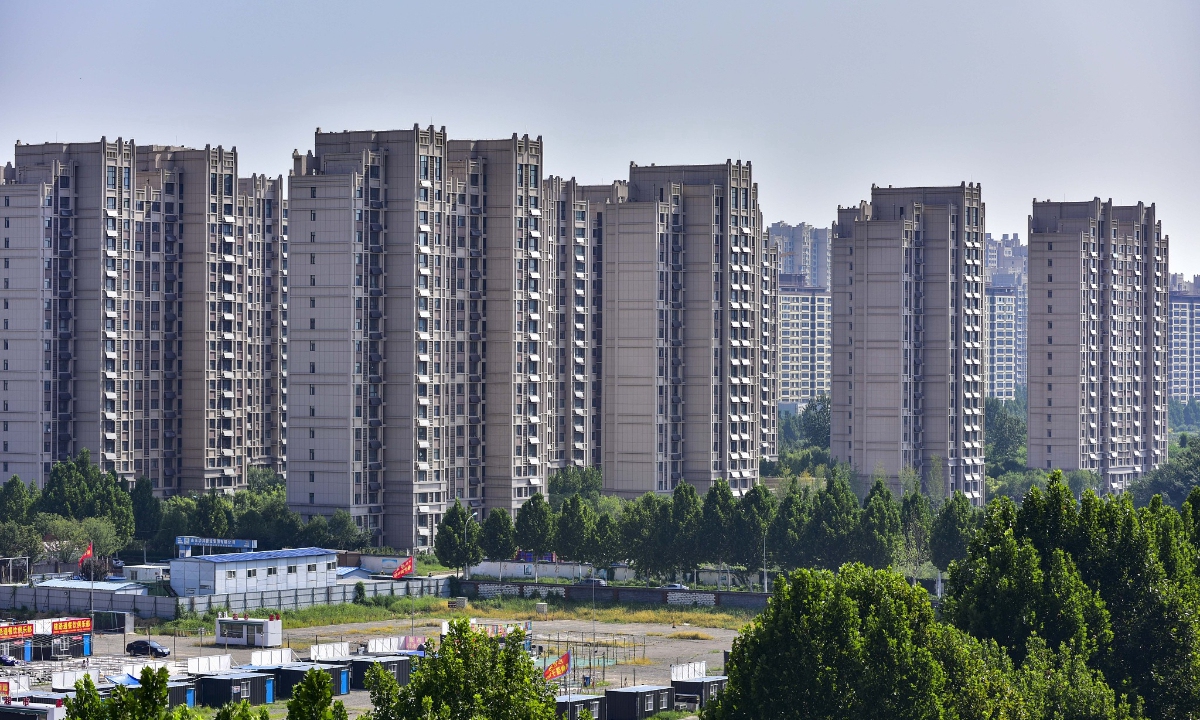Guangzhou, Shenzhen ease home purchase policies; more key cities will follow in effort to warm up China’s property sector

real estate market Photo:VCG
In a significant move, Guangzhou and Shenzhen, both in South China's Guangdong Province, on Wednesday acted first among major cities to ease home purchase policies, sending a strong signal that the country is resolved to revive its property sector.
Guangzhou officially said in a notice that home buyers and their immediate family members will be treated as first-home buyers for loans, regardless of their mortgage record, as long as they don't now own another home in the city.
The move applies to contracts signed after August 18.
Yan Yuejin, research director at Shanghai-based E-house China R&D Institute, said in a note sent to the Global Times on Wednesday that as the first mover among first-tier cities, Guangzhou has set a good example.
"As the most relaxed home purchase policy among tier-1 cities since 2017, Guangzhou's measures carry significant connotations, fully reflecting the major changes in the supply and demand relationship in those cities," Yan said.
All of China's first-tier cities - Beijing, Shanghai, Guangzhou and Shenzhen, also in Guangdong - issued statements in early August, vowing further efforts in line with the local situation to improve the property market, in response to the central government's pledge to stabilize the sector. But Guangzhou was the first to announce specific measures.
"All of them will eventually announce eased measures, given the situation," Yan said, noting that such moves are necessary to bolster market confidence in the property sector, which plays a major role in fueling China's economic output yet has been on a sluggish growth track in recent years.
In the wake of Guangzhou's move, the Housing and Construction Bureau of Shenzhen, the Shenzhen Branch of the People's Bank of China, and the Shenzhen office of the China Banking and Insurance Regulatory Commission jointly issued a notice on Wednesday.
The notice indicates that in order to better meet the housing needs of Shenzhen residents, when a household applies for a loan to purchase residential property, and the family members do not own properties in Shenzhen, banking and financial institutions will apply the housing credit policy for first-time home purchases, regardless of whether they have already used a loan to purchase property. The notice will be effective Thursday.
The other major cities will probably announce their new policies by early September, Yan said. As for the specifics, "it depends, because home sales in the urban areas of the other major cities are still a bit hot," he said.
A representative of domestic real estate agency 5i5J told the Global Times on Wednesday that Beijing might be the last of the four to act and it will be cautious, considering the robust demand and resilient purchasing power in the city, he said.
Prior to the announcements made by Guangzhou and Shenzhen on Wednesday, the four top-tier cities and some large second-tier cities including Chengdu, capital of Southwest China's Sichuan Province and Changsha, capital of Central China's Hunan Province, had strict thresholds for home buyers in terms of mortgage records and home ownership.
According to the E-house China R&D Institute, the down payment ratios for second houses in the four cities were 70-80 percent under the purchase curbs, which were 40-45 percentage points higher than down payments for first homes.
A Beijing-based resident surnamed Wang told the Global Times on Wednesday that she is closely watching the policy changes as she wants to change her current small apartment for a bigger one.
"But under current policies, I would have to pay a higher interest rate and the loan amount will be much lower, since the new home will be treated as a second home, because I have a credit record for my first home," Wang said.
The difference could mean a gap of about 1.2 million yuan ($164,556) on the down payment.
In China, first-home buyers usually get lower mortgage rates and make smaller down payments than others.
Chinese authorities have continuously revealed measures to support the property sector in recent months.
On Friday, the Ministry of Housing and Urban-Rural Development announced that it is in favor of the re-adjustment of mortgage lending-related policies and measures, leaving it to city-level governments to decide if families that own no property in the region are to be treated as first-home buyers eligible for favorable mortgage conditions.
Domestic commercial banks are considering lower interest rates on existing mortgages. A number of bank executives have said during recent earnings conference calls that this has become a trend.
They've studied the situation and made plans, although the move would reduce their net interest margins, a gauge of profitability.
"Cuts will mean some losses for banks, but it is conducive to credit stability in the long run," Yan said, suggesting the rates will be cut by 20 basis points.
An upturn is expected in the property sector in the second half as more cities ease restrictions, driving a recovery of the world's second-largest economy, experts said.
Investment in property development fell 7.9 percent year-on-year in the first half, and commercial housing sales shrank 5.3 percent by floor area, data from the National Bureau of Statistics showed.


